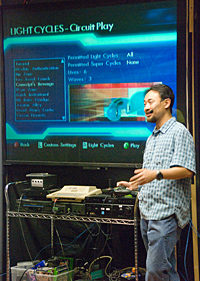Jason Leigh’s Video Game Design Students at LSU and UIC Share Final Projects via HD-Streaming Over Optical Networks
December 7th, 2007
Categories: Animation, Visualization

About
LSU Video Game Design Class Students to Host Competition with University of Illinois at Chicago - Course emphasizes collaboration, interdisciplinary applications.
BATON ROUGE - College classes do not usually involve a five-hour video game marathon, but that will be the end-of-semester activity for Louisiana State University (LSU) students enrolled in the University’s video game design course, taught via high-definition video streaming from Chicago, this semester.
On Friday, Dec. 7, LSU students and their counterparts at University of Illinois at Chicago, or UIC, will present and play video games to showcase the work they’ve accomplished throughout the semester. The game marathon will begin at 2 p.m. in the third-floor classroom in Frey Computing Services Center.
In the class, students learned core concepts to develop and design video games, from storyline to character development to coding. Working together in groups of three to four, the students formed competing video game development companies and developed an original game that highlighted “interaction” using Nintendo Wii motes.
For the final project, each company will showcase its game and participate in the marathon. Professors will evaluate the games on criteria such as interface design, graphics design and programming, and the games will constitute a large component of each student’s final grade.
Jason Leigh, a computer science professor at UIC and director of the university’s Electronic Visualization Laboratory, is teaching the weekly course at LSU from UIC using high-definition streaming over the 10-Gigabit-per-second Louisiana Optical Network Initiative (LONI) that connects Chicago and Baton Rouge.
LSU Department of Computer Science Professor Thomas Sterling taught the first HD-streamed distributed course in the United States in the Spring 2007 semester after working with a team of researchers from LSU Center for Computation & Technology, or CCT, MCNC in North Carolina and Masaryk University in the Czech Republic to pioneer the use of HD streaming across high-speed networks for remote teaching.
Sterling taught his CSC 7600 High Performance Computing: Models, Methods and Means course at LSU using the CCT’s networking and high-definition capabilities. The class was broadcast in HD Louisiana Tech, University of Arkansas, MCNC and Masaryk University.
After the first run of this course, Sterling received funding from the National Science Foundation to expand the class’ broadcasting ability using different media such as DVDs and Podcasts of the lectures. LSU will offer that course again in the Spring 2008 semester.
Following the success of Sterling’s class, the LSU Department of Computer Science, which is working to develop a digital media concentration, saw an opportunity to use the same networking setup and permit LSU students to enroll in a video game design class for course credit.
“With the high-performance computing course, we saw college courses can be successfully exported and imported, allowing students access to a curriculum beyond what is offered at their schools,” said LSU computer science Professor Gabrielle Allen. “We had quite a few LSU students express interest in taking a video game design class and we saw a possibility to bring the talents of a world-renowned gaming expert to them. So, we reversed the broadcast direction from the high-performance computing class to allow our students to take the class physically here at LSU in partnership with UIC.”
The two-way audio / video stream between UIC and LSU is done through LONI via HD Polycom (720p.) UIC’s Electronic Visualization Laboratory is streaming 1080i HD of the Chicago side to LSU, along with the audio from both universities. The Electronic Visualization Laboratory is also digitally recording audio and HD video from both sides for students to access outside the classroom sessions.
At LSU, the course was scheduled both as a computer science course (CSC 4700) and an arts course (FMA 4001), attracting students from both disciplines. The course emphasized links between art and technology, with art students working on the animation and character design together with computer science students who primarily programmed the game. CCT supported the class by providing a Game Lab in the Frey Computing Services Center where students practiced and experimented with the concepts they learned from lectures.
LSU students followed the same syllabus and requirements as the UIC students and have attended Leigh’s class each Friday afternoon during the fall semester. At LSU, Allen and School of Music Professor Stephen David Beck monitor the students’ work and progress.
“Our state has worked hard to establish digital media industry in the past few years, and LONI gives us world-class connectivity. But, one of the key things companies look for when deciding where to establish a business is a talented workforce, and this course helps fulfill the education component,” Beck said. “The combination of a growing industry and training opportunities for students give us a viable economic development opportunity in digital media.”
The Dec. 7 video game marathon is open to media.
For more information on the course, please contact CCT Manager of Public Relations Kristen Sunde at 225-578-3469 or ksunde@cct.lsu.edu